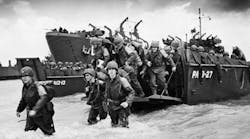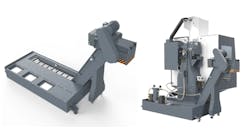Every year on June 6, I feel a shiver run down my spine. As a retired U.S. Army Special Forces (“Green Beret”) officer and combat veteran, I can’t help but remember with awe the tens of thousands of soldiers that executed a simultaneous amphibious and air invasion of Europe. On the night of June 5, paratroopers and glider infantry, followed at dawn by a sweeping amphibious assault, began the invasion of Europe – a military feat that remains without equal in history. That day in 1944 remains the singular feat that ended World War II and the Nazi regime.
The story of the D-Day Invasion holds many lessons for success in business and in life, lessons most people today do not recognize.
The first lesson — to identify what success is — remains far more important that planning how to achieve success. In the preparation for the invasion, the parachute and glider forces trained relentlessly how to achieve their mission objectives of securing bridges, cross roads, and other key terrain following their midnight parachute assault.
However, once the invasion started the airborne infiltration was a disaster. Different airborne forces were mis-dropped and scattered throughout the French countryside. It appeared the invasion might be a disaster.
What saved the day was a military concept called “Commander’s Intent,” in which the military commander identifies what success is so that when a plan has to be adapted, everyone acts with initiative and determination to achieve the mission objectives. That is precisely what happened during the early morning of June 6, 1944, in Normandy. Different airborne units joined together, determined their location, and successfully accomplished their mission. The business lesson from this is that we need to let employees know what we want them to achieve, and why. In that way, the enterprise can adapt quickly to plan changes as well as to a dynamic competitor, and still achieve the business objectives.
The second lesson is that leadership at all levels matter, and matter a lot. We may read accounts of D-Day that the architects of victory were the generals and admirals responsible for planning and executing the invasion. True, but for successful combat operations, like business, success happens on the front lines.
We seldom hear about the USS McCook, a naval destroyer captained by Lieutenant Commander Ralph L. Ramey, assigned to provide gunfire support of the Omaha landing beaches. The McCook steamed close in and parallel to the invasion beaches, providing devastating fire on German positions, but also providing a perfect target for German gunners. The sailors of the USS McCook never touched the sand of France that day, but were critical to the invasion.
For business, those colleagues that meet with customers, ensure safe business environments, create new products, and find ways to reduce costs are your frontline leaders. They are the ones that beat the competition.
Prove, Then Execute
The third lesson is that innovation has to be tested before the battle. During the D-Day invasion, there were several “great” new ideas that failed miserably under combat conditions. During the invasion, paratroopers were given the famous “leg bag” to take extra ammunition, which ripped off in the high winds when they jumped from their airplanes.
Tanks, which were needed for the critical task of establishing a beachhead, were fitted with waterproof “skirts” and other flotation devices so they could swim in to the invasion beaches on their own. Many of the skirts failed and the tanks sank even before reaching the beaches.
The business lesson here is that innovation is critical to delighting customers, but new ideas have to be rigorously tested and improved prior to customer delivery, so that they will not fail at the moment of truth.
The fourth lesson is that small, effective teams positioned at the right place can change everything. For the Allies, the small Jedburgh teams were a silent and essential element. The Jeds were small units trained in espionage, communications, explosives, and ambush, and dropped behind enemy lines months before the invasion. These teams made contact with the French Resistance, scouted German positions, and made their own plans to sabotage German rail lines and troop areas on the nights leading to the invasion. The Jeds made a huge contribution to the successful landing by distracting the Germans in their logistical areas, which provided critical “breathing space” to the invasion forces.
The business lesson is to dedicate resources to teams and technology that can decisively change the game to help your customers – helping your customers succeed more is the best way to defeat the competition.
The final lesson is that training and rehearsal made the difference in the success of the D-Day invasion. Individual soldiers, sailors, and airmen all were trained to know how to do their jobs, but also to fulfill the essential responsibilities of their comrades.
More important, military formations of large groups of people rehearsed day and night so that vital functions of resupply, vehicle repair, and casualty evacuation could be accomplished. The high levels of individual and unit training were vital to reversing the impending signs of disaster on Omaha Beach in the early hours of the invasion.
The business lesson is that training and rehearsals that show how business can do things safer, more cost-effectively, and with fewer defects, will make the business great.
Businesses face enormous challenges in terms of creativity, customer satisfaction, innovation, profitability, and cost, among others that test their readiness for success. Businesses of all sizes can succeed when they remember the hidden lessons of the D-Day Invasion, to identify success, prove the value of leadership, test innovative ideas, create small teams, and train their teams to meet the demands of the market.
On June 6, remember those brave individuals who faced impossible odds, and then apply their lessons to help your organization succeed.
Chad Storlie is an adjunct lecturer of Marketing at Creighton University and Bellevue University in Omaha, the author of “Combat Leader to Corporate Leader” and “Battlefield to Business Success.” Both books teach how to translate and apply military skills to business. Storlie is a retired U.S. Army Special Forces officer with 20+ years of Active and Reserve service in infantry, Special Forces, and joint headquarters units. He served in Iraq, Bosnia, Korea, and throughout the United States, and he was awarded the Bronze Star, the Combat Infantryman’s Badge, the Meritorious Service Medal, the Special Forces Tab, and the Ranger Tab.
In addition, he is a mid-level marketing executive at Union Pacific Railroad and has worked in marketing and sales roles for various companies, including General Electric, Comcast, and Manugistics.






